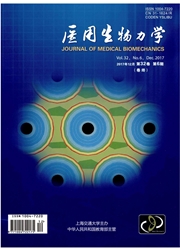

 中文摘要:
中文摘要:
目的数值模拟研究放射治疗下放射敏感性系数、治疗频率、肿瘤细胞成熟年龄等因素对实体肿瘤放射治疗效果的影响。方法建立放射治疗下实体肿瘤演变的连续-离散混合数学模型,模型考虑肿瘤的微环境(氧、细胞外基质、基质降解酶)以及自身行为(增殖、凋亡、黏附)对肿瘤演变的影响,并引入线性二次模型描述肿瘤对放射治疗的响应,采用数值模拟方法模拟不同条件下肿瘤演变的过程,评价放射治疗的疗效。结果肿瘤的放射治疗效果与放射敏感性系数、肿瘤细胞成熟年龄正相关,而在放射剂量总量不变的情况下,高频治疗和低频治疗效果并没有特别明显的区别。结论模拟结果与临床结果相吻合,可为肿瘤放射治疗的理论及临床研究提供一种新的方法。
 英文摘要:
英文摘要:
Objective To study the effects of radiation sensitivity coefficient, frequency of treatment and mature age of tumor cells on therapeutic efficacy by numerical simulation. Methods A hybrid mathematical model for the growth of solid tumor under radiotherapy was established, with considering the influence of both tumor microenvi- ronment (including oxygen, extracellular matrix and matrix-degrading enzymes) and tumor activities (including proliferation, apoptosis and adhesion) on tumor growth. The linear quadratic model was also introduced to depict tumor response to radiotherapy. The progresses of tumor growth under different conditions were simulated to as- sess the therapeutic efficacy. Results The therapeutic efficacy was better when the radiation sensitivity coeffi- cient and mature age of tumor cells increased. When the total amount of the radiation dose was the same, the effects of treatments seemed no difference either with high frequency or low frequency. Conclusions The simula- tion results are consistent with the clinical results, which can provide a new method for the theoretical and clinical research on tumor radiotherapy.
 同期刊论文项目
同期刊论文项目
 同项目期刊论文
同项目期刊论文
 期刊信息
期刊信息
